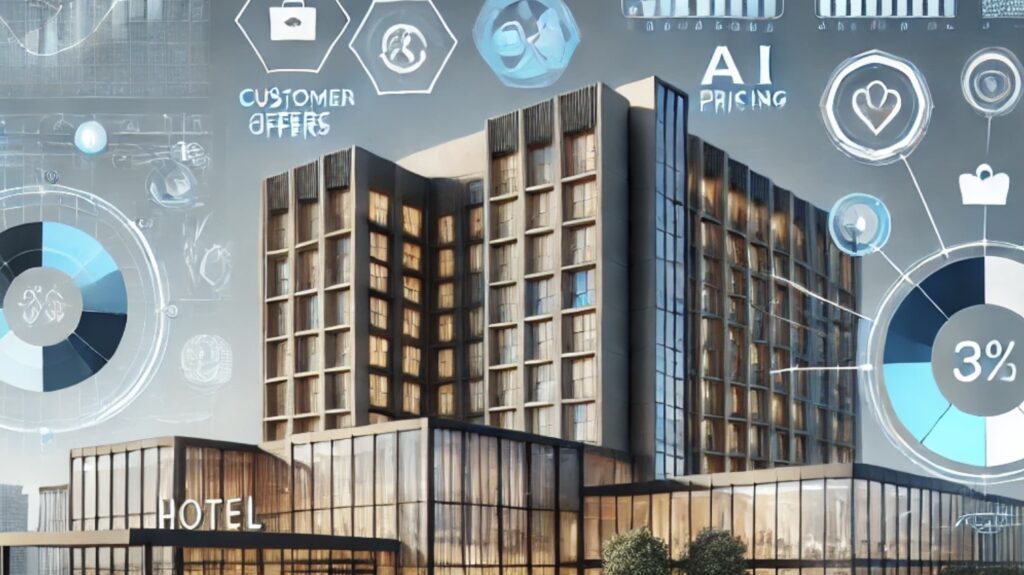Hotel Revenue Management Strategies for 2025
In an increasingly competitive hospitality industry, refining revenue management strategies is no longer optional—essential for driving growth.
As the hospitality industry undergoes rapid change, driven by shifting traveler preferences and technological advancements, hotels face mounting pressure to adapt. In an increasingly competitive market, refining revenue management strategies is no longer optional—essential for driving growth.
In 2025, the hotels that thrive will embrace cutting-edge tools, prioritize data-driven decisions, and create guest-centric experiences. These strategies are about filling rooms and optimizing a hotel’s revenue potential.
Automate, control, customize, and manage guest experience.
What is hotel revenue management?
Hotel revenue management by definition is a strategic practice of maximizing a property’s revenue by predicting consumer behavior and optimizing pricing and inventory. It involves understanding market demand, analyzing data, and utilizing sophisticated tools to make informed pricing decisions.
This approach is essential in the hospitality sector, as it helps align pricing strategies with anticipated demand, ensuring the capture of the highest possible revenue for the hotel. Developing strategies for managing and anticipating guest behavior is a cornerstone of a thriving hospitality business.
The role of revenue managers in hotels
Revenue managers play a critical role in hotels by effectively managing distribution channels to reach potential customers or guests. This responsibility includes optimizing online presence, as most guests begin their booking journeys online. By controlling inventory across various platforms, revenue managers ensure a consistent and strategic offering that aligns with budgetary and revenue goals while adapting to market dynamics and guest preferences.
Inventory control is a vital aspect of revenue management, directly impacting the hotel’s bottom line. Implementing systems that allow for real-time adjustments to inventory enables quick responses to changes in demand. This agility in managing room availability and pricing minimizes missed opportunities and maximizes profits during high-demand periods, ultimately driving sustained financial success for the hotel. Through these strategies, revenue managers contribute significantly to the overall performance and competitiveness of the property in a dynamic market.

Hotel Revenue Management Strategies for 2025
Now you know what to include in your digital hotel welcome book, you can write your own. Here’s our hotel welcome book template for you to adapt, saving you the time and hassle of creating your own from scratch:
1. Dynamic Pricing and Real-Time Rate Adjustments
Dynamic pricing remains at the forefront of revenue management strategies. In 2025, hoteliers must fully use advanced pricing tools powered by artificial intelligence (AI) and machine learning (ML). These tools analyze historical data, competitor rates, market demand, and booking trends to optimize room rates in real-time.
Example: An example of this strategy is Taylor Swift’s Eras Tour, where hotels like Germain Hotels offer walking distance accommodations to Swifties.
2. Total Revenue Management (TRM)
Hotels are no longer solely reliant on room revenue. Adopting a Total Revenue Management approach allows properties to optimize earnings across all revenue streams, including food and beverage outlets, meeting spaces, spa services, and ancillary offerings.
Example: A resort in Bali offers off-season promotions to increase revenue by bundling spa, dining, and tour packages with room bookings during off-peak seasons.
3. Personalized Offers and Upselling Opportunities
Personalization is key to enhancing guest satisfaction and boosting revenue. Utilizing guest data and segmentation allows hotels to deliver personalized offers, upgrades, and upselling opportunities that align with individual preferences and needs.
Example: Rosewood Hotel in Paris outclassing competitors, offering guests curated wine-tasting experiences based on pre-stay survey preferences.
4. Data-Driven Decision Making
In 2025, successful revenue management will hinge on the ability to make decisions backed by data. By analyzing guest behavior, booking patterns, and market trends, hotels can anticipate demand and tailor their strategies accordingly.
Example: Data analysis of 500 hotels in the Las Vegas Strip saves 30% from booking 30 days in advance compared to walk-in rates – leveraging historical booking patterns and integrating local event calendars into their demand forecasting model.
5. Focus on Direct Bookings
Reducing reliance on Online Travel Agencies (OTAs) is a top priority for many hotels. Direct bookings not only drive higher margins but also strengthen guest relationships.
Example: A UK-based hotel chain saw a 14% increase in direct bookings by improving their booking engine, converting website traffic into bookings.
6. Optimizing Distribution Channels
Effective distribution channel management ensures that your rooms are available where demand is highest. By balancing OTAs, Global Distribution Systems (GDS), and direct channels, hotels can maximize visibility and profitability.
Example: A boutique hotel increased by 20% direct bookings and 15% improvement by optimizing its distribution channels.
7. Embracing Automation and AI
Automation and AI are revolutionizing revenue management. From automating rate changes to using AI for demand forecasting, these technologies streamline processes and unlock revenue potential.
Example: A fictional scenario featuring The Hanson Hotel illustrates AI and Automation’s potential impact in a hotel setting.
8. Revenue Diversification with Non-Room Services
Beyond traditional room sales, hotels can capitalize on non-room revenue streams, including coworking spaces, food and beverage, and curated guest experiences.
Example: An old case study published by the Taiwan Tourism Bureau (1996-2008) shows that international tourists hotels generate 60% of their revenue from F&B services.
9. Sustainable Revenue Management Practices
Sustainability initiatives resonate with modern travelers and can serve as a competitive differentiator. Hotels that adopt eco-friendly practices can appeal to socially conscious guests while saving costs in the long run.
10. Leveraging Technology to Improve Forecasting
Accurate demand forecasting enables hotels to prepare for peak seasons, optimize staffing, and improve inventory management. By integrating forecasting tools with property management systems (PMS), hotels can predict trends more accurately.
The Bottom Line
Hotel revenue management in 2025 will be defined by adaptability, technology adoption, and guest-centric strategies. By embracing dynamic pricing, leveraging AI, and diversifying revenue streams, hotels can enhance profitability and boost hotel upsells.
Implementing these strategies now, backed by actionable insights and real-world examples, will position your property as a leader in an increasingly competitive market.
Frequently asked questions about digital hotel welcome books
Hotels have a fantastic opportunity to boost their earnings by harnessing the power of revenue management systems (RMS). These tools dive deep into historical data to predict future demand, allowing hotels to adjust room rates on the fly. By considering important factors like occupancy rates, seasonal trends, and what competitors are charging, hotels can stay ahead of the game.
Strategic pricing strategies can further amplify revenue—think enticing discounts for early birds or premium rates during peak seasons. With the right approach, hotels can not only attract more guests but also maximize their profits in a dynamic market!
Effective revenue management is essential for the hospitality industry, as it enables hotels to enhance their profitability by strategically managing their room inventory and pricing structures.
By gaining insights into consumer behavior and leveraging predictive analytics, hotels can optimize occupancy levels and boost their revenue per available room (RevPAR). This approach not only maximizes earnings but also aligns pricing strategies with market demand, making it a vital component of successful hotel operations. Embracing innovative techniques can help properties stay competitive and ensure long-term financial health in a dynamic marketplace.
In the ever-evolving hospitality industry, hoteliers grapple with several key challenges that can affect their success. Accurate demand forecasting is crucial, as it impacts staffing and inventory management. Additionally, managing distribution channels effectively is vital for balancing direct bookings with third-party platforms, while also setting competitive pricing strategies that respond to market dynamics.
Adapting to rapid market changes—whether due to economic shifts or emerging travel trends—requires agility and foresight. Furthermore, integrating new technologies, such as revenue management systems, enhances decision-making but demands proper staff training for effective utilization.
Navigating these challenges calls for a strategic approach, adaptability, and a commitment to continuous learning—essential traits for any hotelier looking to excel in today’s competitive landscape.
More Articles
Ready to enhance guest experience and earn more revenue?



![5 Steps to Scale Your Vacation Rental Business [2024]](https://operto.com/wp-content/uploads/2022/11/shutterstock_1575539170-scaled.jpg)
